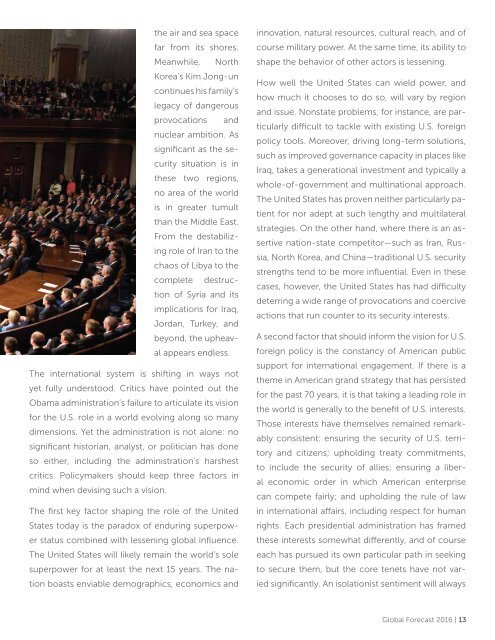Create successful ePaper yourself
Turn your PDF publications into a flip-book with our unique Google optimized e-Paper software.
the air and sea space<br />
far from its shores.<br />
Meanwhile, North<br />
Korea’s Kim Jong-un<br />
continues his family’s<br />
legacy of dangerous<br />
provocations and<br />
nuclear ambition. As<br />
significant as the security<br />
situation is in<br />
these two regions,<br />
no area of the world<br />
is in greater tumult<br />
than the Middle East.<br />
From the destabilizing<br />
role of Iran to the<br />
chaos of Libya to the<br />
complete destruction<br />
of Syria and its<br />
implications for Iraq,<br />
Jordan, Turkey, and<br />
beyond, the upheaval<br />
appears endless.<br />
The international system is shifting in ways not<br />
yet fully understood. Critics have pointed out the<br />
Obama administration’s failure to articulate its vision<br />
for the U.S. role in a world evolving along so many<br />
dimensions. Yet the administration is not alone: no<br />
significant historian, analyst, or politician has done<br />
so either, including the administration’s harshest<br />
critics. Policymakers should keep three factors in<br />
mind when devising such a vision.<br />
The first key factor shaping the role of the United<br />
States today is the paradox of enduring superpower<br />
status combined with lessening global influence.<br />
The United States will likely remain the world’s sole<br />
superpower for at least the next 15 years. The nation<br />
boasts enviable demographics, economics and<br />
innovation, natural resources, cultural reach, and of<br />
course military power. At the same time, its ability to<br />
shape the behavior of other actors is lessening.<br />
How well the United States can wield power, and<br />
how much it chooses to do so, will vary by region<br />
and issue. Nonstate problems, for instance, are particularly<br />
difficult to tackle with existing U.S. foreign<br />
policy tools. Moreover, driving long-term solutions,<br />
such as improved governance capacity in places like<br />
Iraq, takes a generational investment and typically a<br />
whole-of-government and multinational approach.<br />
The United States has proven neither particularly patient<br />
for nor adept at such lengthy and multilateral<br />
strategies. On the other hand, where there is an assertive<br />
nation-state competitor—such as Iran, Russia,<br />
North Korea, and China—traditional U.S. security<br />
strengths tend to be more influential. Even in these<br />
cases, however, the United States has had difficulty<br />
deterring a wide range of provocations and coercive<br />
actions that run counter to its security interests.<br />
A second factor that should inform the vision for U.S.<br />
foreign policy is the constancy of American public<br />
support for international engagement. If there is a<br />
theme in American grand strategy that has persisted<br />
for the past 70 years, it is that taking a leading role in<br />
the world is generally to the benefit of U.S. interests.<br />
Those interests have themselves remained remarkably<br />
consistent: ensuring the security of U.S. territory<br />
and citizens; upholding treaty commitments,<br />
to include the security of allies; ensuring a liberal<br />
economic order in which American enterprise<br />
can compete fairly; and upholding the rule of law<br />
in international affairs, including respect for human<br />
rights. Each presidential administration has framed<br />
these interests somewhat differently, and of course<br />
each has pursued its own particular path in seeking<br />
to secure them, but the core tenets have not varied<br />
significantly. An isolationist sentiment will always<br />
Global Forecast 2016 | 13


